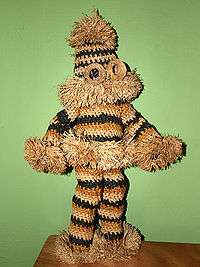Kikwit
| Kikwit | |
|---|---|
 Kikwit Location in Democratic Republic of the Congo | |
| Coordinates: 5°02′19″S 18°49′05″E / 5.03861°S 18.81806°ECoordinates: 5°02′19″S 18°49′05″E / 5.03861°S 18.81806°E | |
| Country |
|
| Province | Kwilu Province |
| Area | |
| • Total | 92 km2 (36 sq mi) |
| Elevation | 452 m (1,483 ft) |
| Population (2012) | |
| • Total | 397,737 |
| • Density | 4,300/km2 (11,000/sq mi) |
| Climate | Aw |
| National language | Kikongo |
Kikwit is the largest city and capital of Kwilu Province, lying on the Kwilu River in the southwestern part of the Democratic Republic of Congo. Kikwit is also known in the region under the nickname "The Mother". The population is approximately 397,737 (2012). An important commercial and administrative centre, it is home to a stadium and is known for its traditional dances, in particular the Bapende dancers whose geographic origin centers on the village of Gungu. Bapende dancers often wear traditional costumes comprising colorful masks and attire made from raffia. Kikwit is also home to an airport and is connected to the capital Kinshasa by a new road and river transport.

In 1995 the city saw a serious outbreak of the deadly Ebola virus.[1]
Singer King Kester Emeneya was born in Kikwit in 1956. In April 2014, a tribute concert held in Kikwit to honor King Kester Emeneya ended in disaster, and least thirteen people in the stadium lost their lives in a stampede following a power failure.[2]
See also
References
- ↑ "Outbreak of Ebola Viral Hemorrhagic Fever -- Zaire, 1995". Centers for Disease Control. 19 May 1995. Retrieved 7 April 2014.
- ↑ "Deadly stampede at tribute concert in Democratic Republic of Congo". Deutsche Welle. 2014-04-25. Retrieved 2014-04-29.